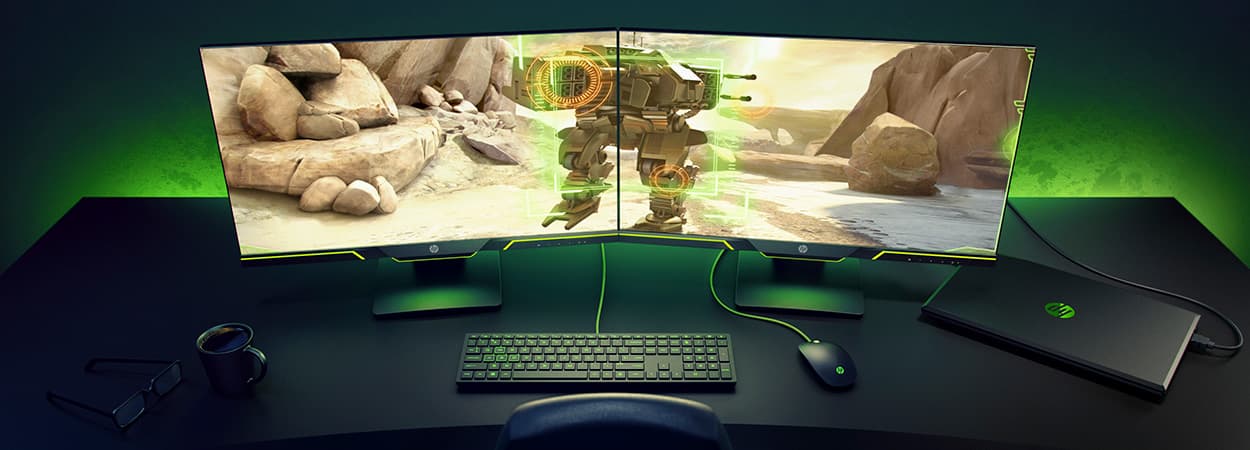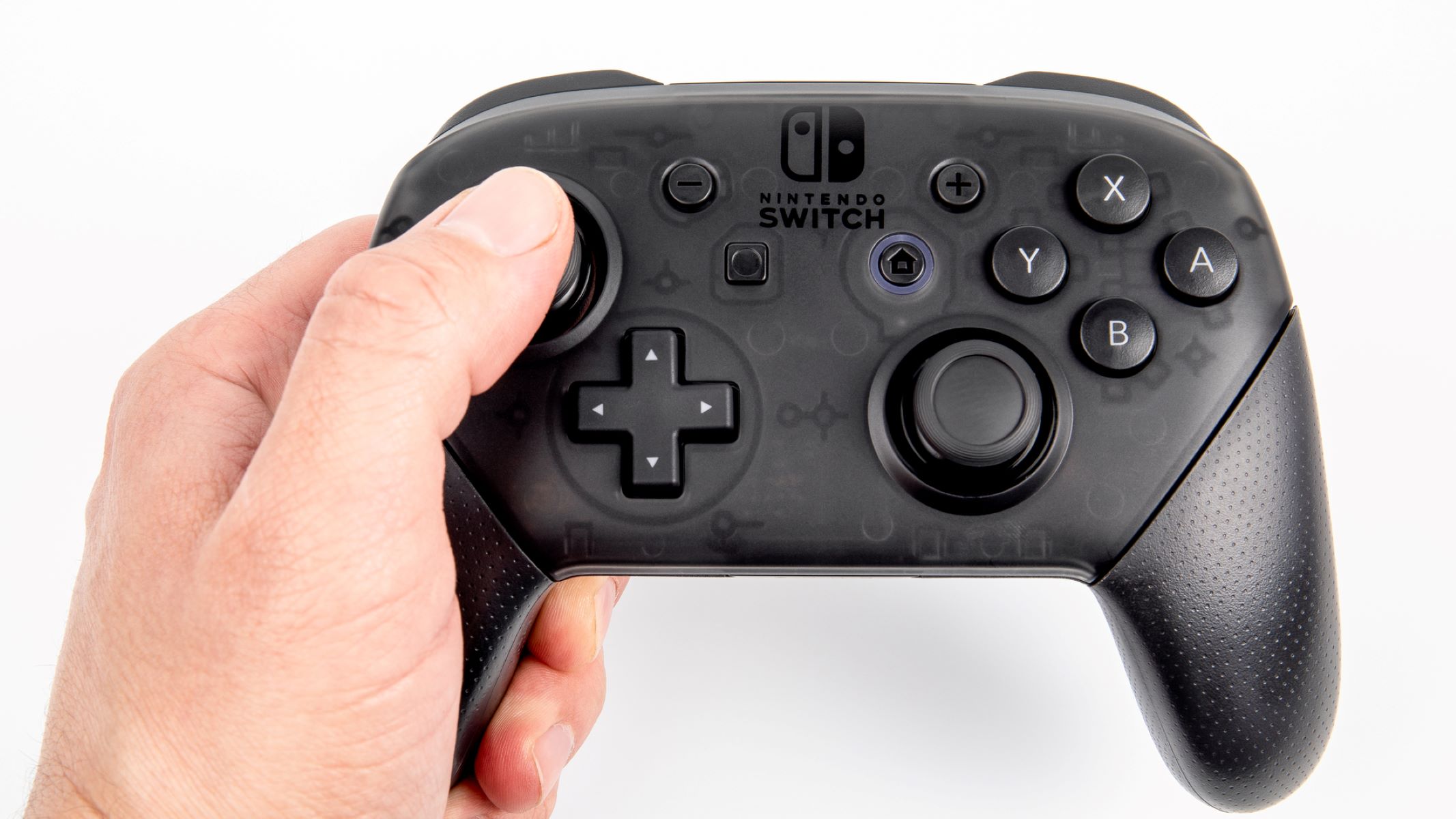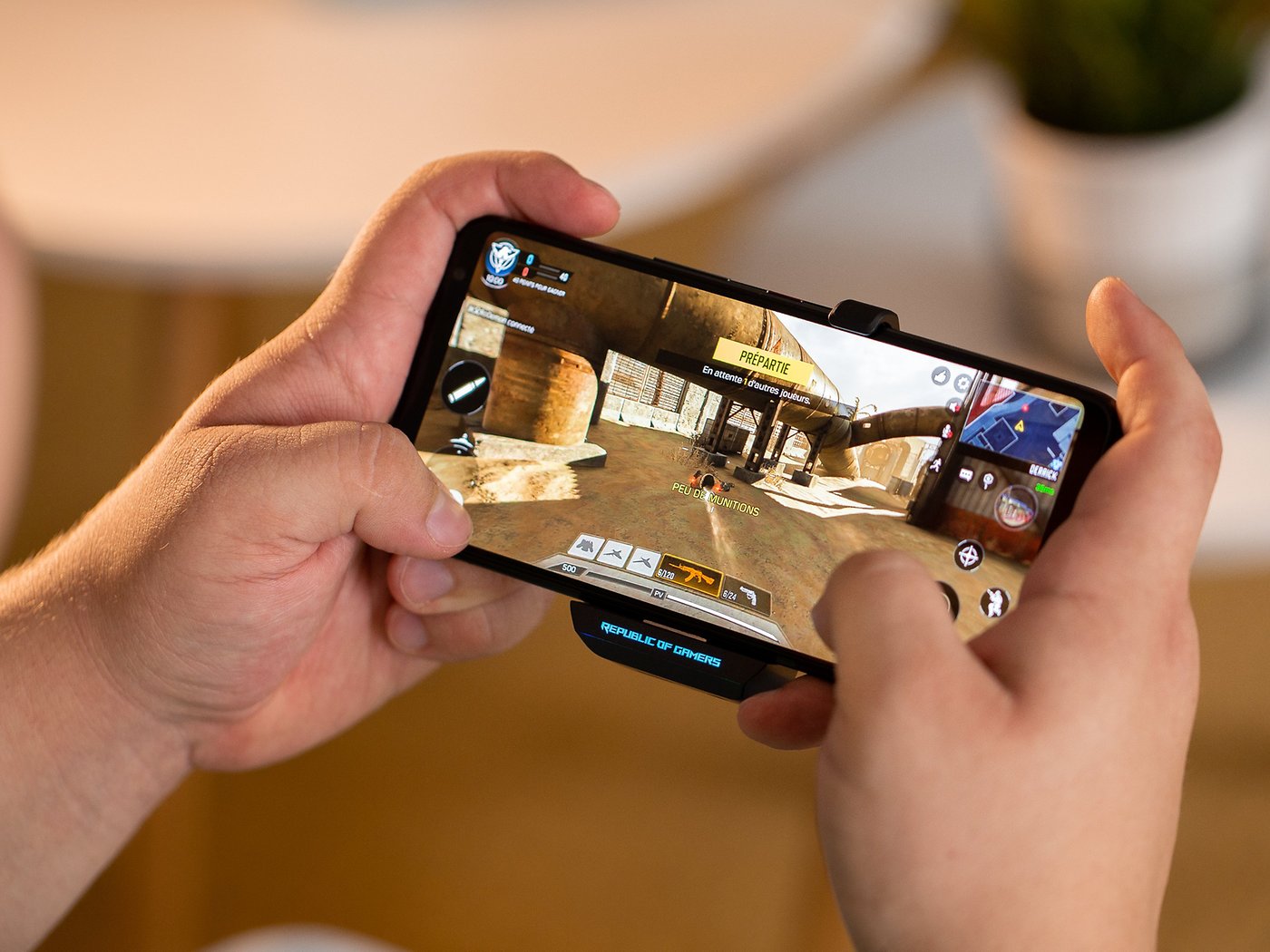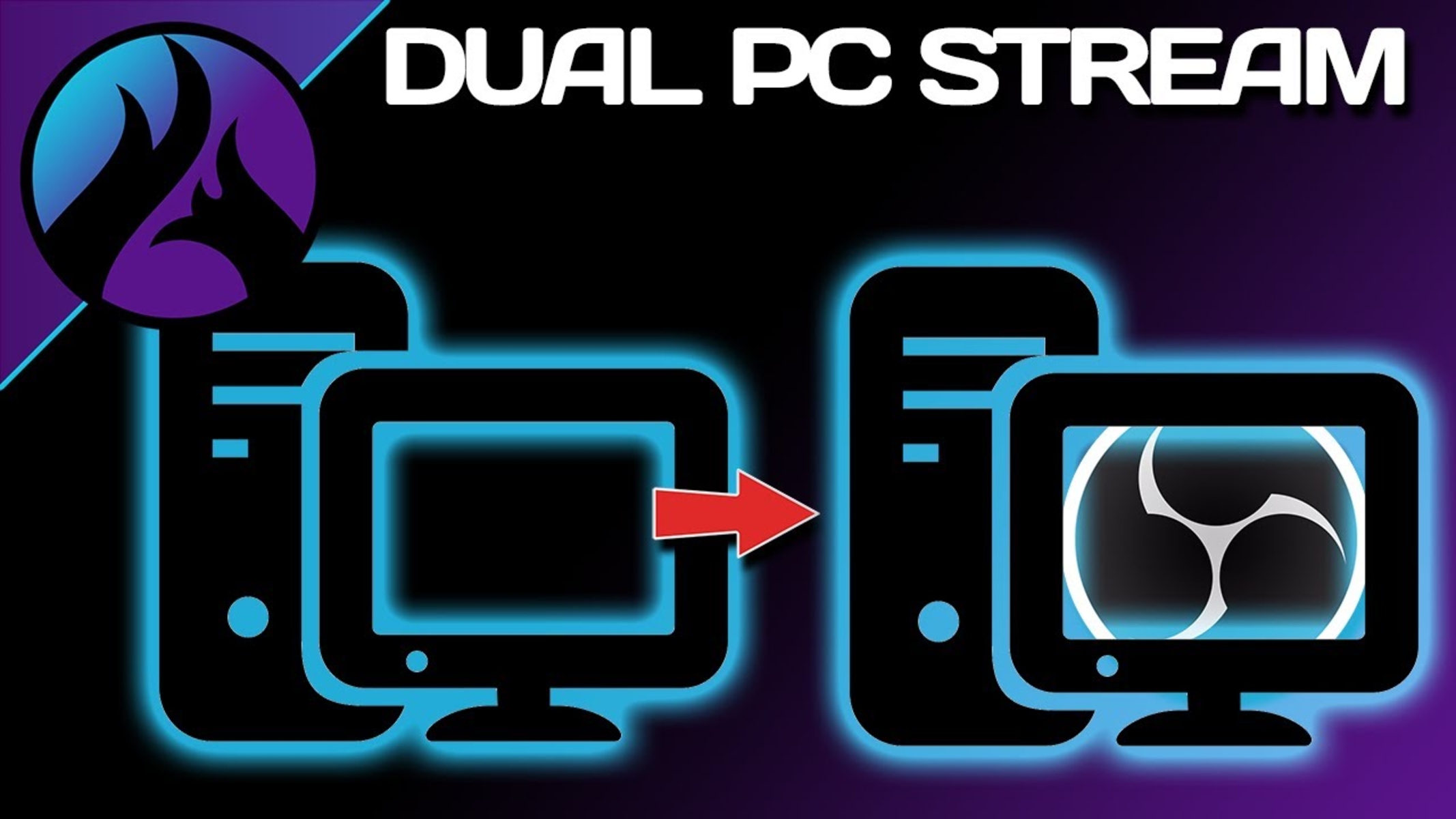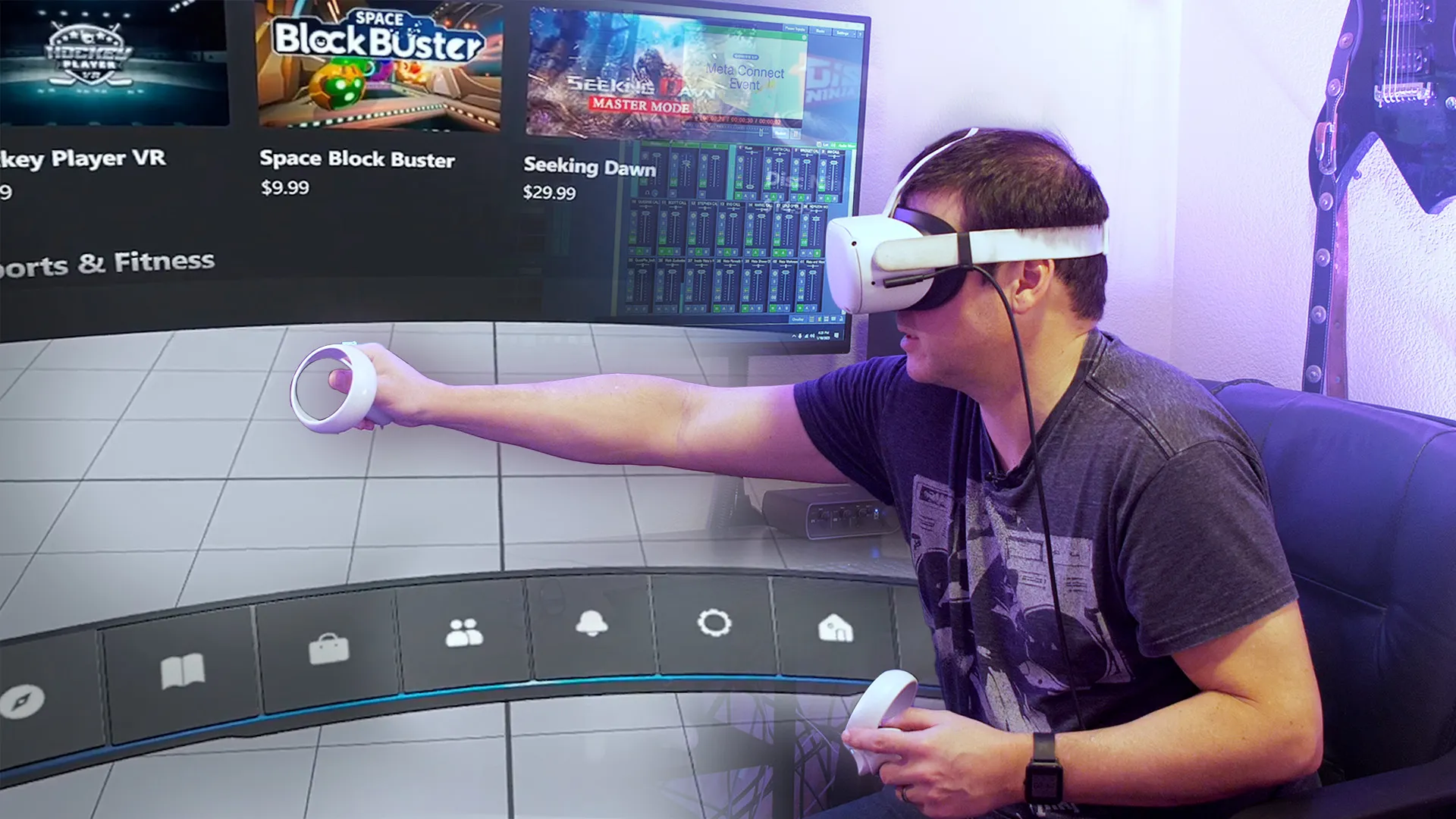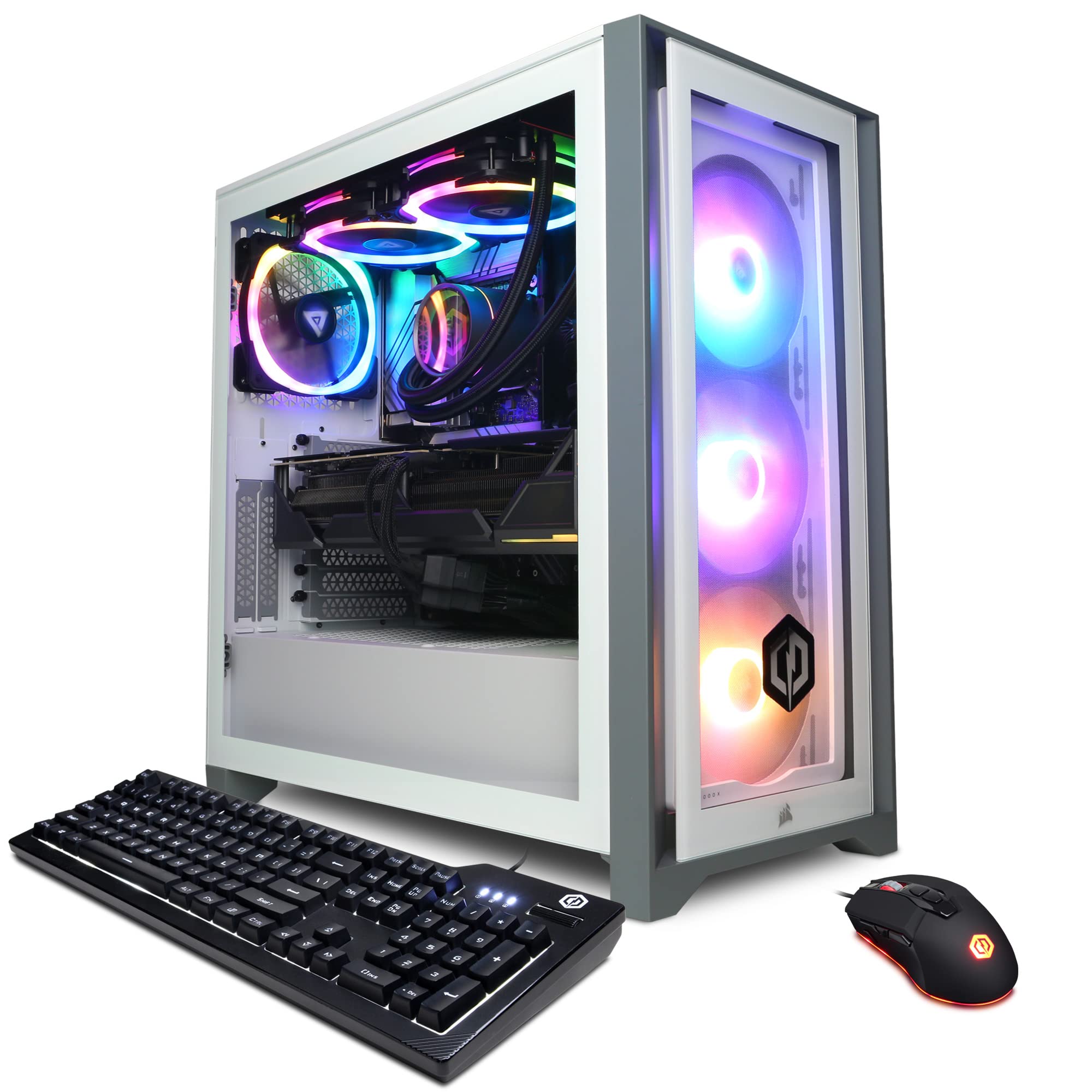Introduction
Welcome to the exciting world of gaming! If you’re new to the realm of video games, you may be wondering what all the fuss is about. Well, you’ve come to the right place. In this article, we’re going to explore the wonderful world of PC gaming and why it has become such a popular choice for gamers around the globe.
Gaming on a PC offers a unique and immersive experience that allows players to explore virtual worlds, engage in thrilling adventures, and compete with friends and other gamers from the comfort of their own homes. With stunning graphics, realistic sound effects, and precise controls, PC gaming has revolutionized the way we play and interact with video games.
But what exactly is a PC for gaming? Simply put, it’s a computer that has been specifically designed and optimized for playing video games. Unlike regular desktop computers, gaming PCs are built with powerful hardware components that can handle the demanding requirements of modern games. From high-performance processors and efficient graphics cards to ample memory and fast storage options, gaming PCs are built to deliver the best gaming experience possible.
In this article, we’ll delve into the various components that make up a gaming PC and discuss their importance in ensuring smooth gameplay and stunning visuals. We’ll also explore the advantages of gaming on a PC, including the flexibility and customization options that are unique to the platform. Additionally, we’ll compare gaming PCs to consoles and highlight the pros and cons of each. Whether you’re a seasoned gamer or just starting out, this article will provide valuable insights into the world of PC gaming.
So, grab your keyboard, put on your gaming headset, and get ready to dive into the exhilarating world of PC gaming!
What Is a PC for Gaming?
A PC for gaming is a computer system that is specifically designed to provide an optimal gaming experience. Unlike regular desktop computers, gaming PCs are equipped with powerful hardware components that can handle the demanding requirements of modern video games. These components are carefully selected and assembled to deliver fast processing speeds, high-quality graphics, and smooth gameplay.
One of the primary components that differentiate a gaming PC from a regular computer is the graphics processing unit (GPU). The GPU is responsible for rendering and displaying the visuals of the game, ensuring that you experience stunning graphics and realistic animations. Gaming PCs often feature dedicated video cards with powerful GPUs to deliver superior graphical performance.
Another crucial component of a gaming PC is the central processing unit (CPU). The CPU is responsible for executing the instructions of the game and coordinating the various tasks that happen behind the scenes. Gaming PCs typically come with high-performance CPUs that can handle the complex calculations required by modern games.
Memory and storage are also essential aspects of a gaming PC. Adequate memory, commonly known as RAM (random access memory), allows the computer to handle multiple tasks simultaneously, ensuring smooth performance during gameplay. Additionally, gaming PCs are equipped with fast and spacious storage options, such as solid-state drives (SSDs), that allow for quick loading times and ample space to store games and other media.
The display is another critical consideration when it comes to gaming PCs. High-resolution monitors with fast refresh rates are favored by gamers, as they offer sharp visuals and reduce motion blur during fast-paced gameplay. Many gaming PCs support advanced display technologies, such as G-Sync or FreeSync, which enhance the smoothness and responsiveness of the visuals.
Peripherals and accessories complete the gaming PC experience. These include gaming keyboards, mice, controllers, and headsets specially designed to enhance gameplay. Backlit keyboards with programmable keys, ergonomic gaming mice with high-precision sensors, and immersive headsets with surround sound capabilities are just a few examples of the peripherals that can elevate your gaming experience.
In summary, a gaming PC is a computer system that is specifically tailored to deliver an exceptional gaming experience. By combining powerful hardware components, ample memory and storage, high-resolution displays, and specialized peripherals, gaming PCs offer unparalleled graphical fidelity, smooth gameplay, and customizable options. Whether you’re a casual gamer or a hardcore enthusiast, a gaming PC allows you to fully immerse yourself in the vast and captivating worlds of modern video games.
Benefits of Gaming on a PC
Gaming on a PC offers a multitude of benefits that set it apart from other gaming platforms. Whether you’re a casual gamer or a competitive esports player, here are some advantages of gaming on a PC:
1. Superior Graphics and Performance: One of the standout benefits of PC gaming is the ability to enjoy stunning graphics and high-performance gameplay. Gaming PCs are equipped with powerful processors and graphics cards that can handle the latest games with ease. With higher resolutions, faster frame rates, and more detailed textures, PC gaming delivers a visually immersive experience.
2. Customization and Flexibility: PC gaming allows for extensive customization options, both in terms of hardware and software. From building your own gaming rig to customizing game settings and mods, PC gamers have the freedom to create a gaming experience that is tailored to their preferences. This flexibility extends to game libraries as well, as PC gamers have access to a wide range of titles from different platforms.
3. Varied Control Options: PC gaming offers a diverse range of control options, including keyboards, mice, controllers, and even virtual reality (VR) devices. This allows gamers to choose the control scheme that best suits their playing style and preferences, providing a more comfortable and intuitive gaming experience.
4. Wide Range of Game Selection: PC gaming boasts an extensive library of games, encompassing various genres and styles. From popular AAA titles to indie gems, there is something for everyone in the world of PC gaming. You also have access to digital distribution platforms like Steam, which offers a vast catalog of games that can be downloaded and played instantly.
5. Online Gaming Community: PC gaming has a thriving online community that allows players to connect, compete, and collaborate with gamers from around the world. Whether you’re engaging in multiplayer battles or joining online forums and communities, PC gaming offers a social aspect that enhances the overall gaming experience.
6. Upgradability and Longevity: Unlike consoles, gaming PCs can be easily upgraded to keep up with the latest technologies and advancements. This means that your gaming rig can evolve and adapt to meet the demands of future games, ensuring a longer lifespan and continued enjoyment.
7. Modding and User-generated Content: PC gaming provides the opportunity to explore and experience user-generated content and mods. From custom maps and levels to game modifications that add new features and gameplay mechanics, PC gamers can expand and enhance their gaming experiences in unique and creative ways.
Overall, gaming on a PC offers unparalleled graphics, performance, customization options, and a vast selection of games. With the ability to upgrade and customize your setup, connect with a vibrant gaming community, and experience user-generated content, PC gaming provides a dynamic and immersive experience that caters to gamers of all levels.
Components of a Gaming PC
A gaming PC is composed of several key components, each playing a crucial role in delivering optimal performance and graphics. Understanding these components will help you make informed decisions when building or upgrading your gaming rig. Here are the main components of a gaming PC:
1. Central Processing Unit (CPU): The CPU, often referred to as the “brain” of the computer, handles all the processing tasks. In gaming PCs, a powerful CPU can handle complex calculations and ensure smooth gameplay. Opt for a multi-core processor with a high clock speed for the best gaming performance.
2. Graphics Processing Unit (GPU): The GPU is responsible for rendering and displaying the visuals of the game. Gaming PCs typically have dedicated GPUs with their own video memory. Look for a GPU that can handle the graphics demands of the games you play, ensuring smooth and realistic visuals.
3. Random Access Memory (RAM): RAM is the temporary storage that holds the data needed by the CPU for quick access. Having ample RAM allows your gaming PC to handle multiple tasks and load game assets more efficiently. Aim for at least 8GB of RAM for a seamless gaming experience.
4. Storage: Gaming PCs require sufficient storage to store games, applications, and other files. Solid-state drives (SSDs) are highly recommended for faster load times and improved system responsiveness. Consider pairing an SSD with a larger hard disk drive (HDD) to balance speed and storage capacity.
5. Motherboard: The motherboard is the main circuit board that connects and allows communication between all the components of the gaming PC. Choose a motherboard that is compatible with your chosen CPU and has enough expansion slots for future upgrades.
6. Power Supply Unit (PSU): The PSU provides power to all components of the gaming PC. It is crucial to have a reliable and appropriately sized PSU to ensure stable and efficient power delivery. Consider the power requirements of your components and opt for a PSU with a higher wattage for future upgrades.
7. Cooling System: Gaming PCs generate a significant amount of heat, so proper cooling is essential to prevent overheating and ensure optimal performance. This can be achieved through a combination of fans, heat sinks, and liquid cooling solutions. Adequate airflow is crucial to maintaining lower temperatures and increasing the lifespan of your components.
8. Case: The case houses and protects all the components of the gaming PC. It should have sufficient space to accommodate your chosen components and support proper airflow. Look for a case that appeals to your aesthetic preferences and has adequate cable management options.
9. Peripherals and Accessories: While not essential components of a gaming PC, peripherals and accessories greatly enhance the gaming experience. These include gaming keyboards, mice, controllers, headsets, and monitors. Choose peripherals that are comfortable, precise, and tailored to your specific gaming needs.
By understanding the components of a gaming PC, you can make informed decisions when building or upgrading your system. Consider your gaming preferences, budget, and the requirements of the games you plan to play to ensure optimal performance and an immersive gaming experience.
CPU and GPU: The Power Duo
The CPU (Central Processing Unit) and GPU (Graphics Processing Unit) are the dynamic duo that powers a gaming PC. These two components work closely together to deliver the performance and graphics required for an immersive gaming experience. Let’s take a closer look at the roles and importance of the CPU and GPU in a gaming PC:
CPU: The CPU is often referred to as the “brain” of the computer, and it performs all the necessary calculations and processing tasks. In gaming, the CPU handles tasks such as physics simulations, artificial intelligence, and game logic. It ensures that the game runs smoothly and processes user inputs accurately. A powerful CPU is crucial for minimizing lag, keeping frame rates high, and delivering a seamless gaming experience.
When choosing a CPU for gaming, look for a processor that offers high clock speeds and multiple cores. This allows the CPU to handle the demanding computations required by modern games. CPUs from Intel and AMD are popular choices among gamers, with options available at various price points to suit different budgets.
GPU: While the CPU handles most of the game’s calculations and processes, it is the GPU that takes care of rendering and displaying the game’s visuals. The GPU accelerates the creation of images, animations, and special effects, ensuring that they are rendered and displayed to the screen smoothly and with high quality.
In gaming PCs, dedicated GPUs are essential for delivering optimal graphics performance. These GPUs have their own video memory and processing cores designed specifically for handling complex graphical computations. NVIDIA and AMD are major players in the GPU market, offering a range of options to suit different gaming needs and budgets.
Modern games are becoming increasingly demanding in terms of graphics and visual effects. A powerful GPU ensures that you can enjoy games with high resolutions, detailed textures, and realistic lighting and shadows. It also plays a significant role in enabling technologies such as ray tracing and VR (Virtual Reality).
Both the CPU and GPU work in tandem to bring a game to life on your screen. While the CPU handles the computational tasks, the GPU focuses on rendering and displaying the visuals. The performance and capabilities of both components are crucial for a smooth gaming experience with stunning graphics.
When building or upgrading a gaming PC, it is important to find the right balance between the CPU and GPU. Generally, investing more in a high-performance GPU is advisable, as it has a more substantial impact on gaming visuals. However, the CPU should still be capable enough to support the GPU and handle other non-graphics-related tasks efficiently.
Overall, the CPU and GPU form a powerful duo at the heart of a gaming PC. They work together to deliver the performance, visual fidelity, and immersive experience that gamers desire. By choosing the right combination of CPU and GPU, you can ensure that your gaming rig is capable of handling the latest games and providing an unforgettable gaming journey.
Memory and Storage
Memory (RAM) and storage are crucial components in a gaming PC, as they directly impact the speed, performance, and overall gaming experience. Let’s explore the significance of memory and storage in a gaming setup:
Memory (RAM): RAM, or Random Access Memory, is a type of volatile memory that stores data temporarily while your computer is running. In gaming, having sufficient RAM allows your system to handle multiple tasks simultaneously, ensuring smooth gameplay and efficient performance.
When it comes to gaming, it is recommended to have a minimum of 8GB of RAM. However, for more demanding games or if you engage in multitasking while gaming, opting for 16GB or even 32GB of RAM can provide an extra boost. Additional RAM allows for faster data access and reduces the need for the system to rely on slower storage options.
Storage: Storage is where all your games, applications, and files are stored on your gaming PC. There are various storage options available, each with its advantages and considerations:
– Hard Disk Drive (HDD): HDDs are traditional storage devices that offer large capacities at an affordable price. They are perfect for storing a vast library of games and media. However, HDDs are slower than other storage options, resulting in longer load times in games and slower overall system performance.
– Solid-State Drive (SSD): SSDs use flash memory and are significantly faster than HDDs. They provide faster game loading times, quicker file transfers, and overall snappier system performance. SSDs are increasingly popular in gaming PCs due to their speed and reliability.
– NVMe SSD: NVMe (Non-Volatile Memory Express) SSDs are the fastest storage option available for gaming PCs. They connect directly to the motherboard via the PCIe interface, offering incredible read and write speeds. NVMe SSDs are ideal for gamers who want the fastest possible load times and highly responsive gameplay.
For gaming PCs, it is recommended to have a combination approach to storage. A smaller-capacity SSD can be used as the primary drive to install the operating system, frequently played games, and commonly used applications. This allows for faster boot times and quick access to essential files. Additionally, adding a larger capacity HDD provides ample storage space for less frequently accessed files, media, and games.
It is worth noting that some games benefit from faster storage options more than others. Open-world games and those with large, detailed worlds often see the most noticeable improvements in loading times when installed on an SSD or NVMe SSD.
When building or upgrading a gaming PC, striking the right balance between memory and storage is crucial. Sufficient RAM ensures smooth multitasking and gameplay, while fast storage options reduce loading times and improve overall system performance. By optimizing these components, you can create a gaming system that delivers the best possible gaming experience.
Monitor and Display
The monitor and display are vital components of a gaming PC, directly influencing the visual quality and overall gaming experience. A high-resolution display with fast refresh rates can greatly enhance your gameplay and make the visuals come to life. Let’s delve into the importance of the monitor and display in a gaming setup:
Resolution: The resolution of a monitor refers to the number of pixels it can display. Higher resolutions, such as 1080p (Full HD), 1440p (Quad HD), and 4K (Ultra HD), offer sharper and more detailed visuals. A higher resolution allows for a more immersive gaming experience, allowing you to see finer details in games and appreciate the stunning graphics.
Refresh Rate: The refresh rate of a monitor indicates how many times per second the image on the screen is refreshed. A higher refresh rate, typically measured in Hertz (Hz), results in smoother and more fluid animation, reducing motion blur during fast-paced gaming. Most gaming monitors offer refresh rates of 60Hz, 144Hz, or even higher, with some models going up to 240Hz.
Response Time: The response time of a monitor refers to how quickly a pixel can switch from one color to another. A lower response time reduces ghosting and motion blur, resulting in sharper and more responsive visuals during fast-paced gaming. Aim for a monitor with a response time of 5ms or lower for smooth gameplay and minimal motion blur.
Panel Type: Gaming monitors come in various panel types, each with its own strengths and considerations:
– TN (Twisted Nematic): TN panels offer fast response times and high refresh rates, making them suitable for competitive gaming. However, they often have limited viewing angles and color accuracy.
– IPS (In-Plane Switching): IPS panels provide better color accuracy and wider viewing angles compared to TN panels. They deliver vibrant and consistent colors, making them a popular choice for gamers who prioritize visual quality.
– VA (Vertical Alignment): VA panels offer a balance between the fast response times of TN panels and the better color reproduction of IPS panels. They provide deeper blacks and better contrast ratios, enhancing the visual experience.
Adaptive Sync Technologies: Adaptive Sync technologies, such as NVIDIA G-Sync and AMD FreeSync, help to eliminate screen tearing and stuttering by synchronizing the monitor’s refresh rate with the GPU’s output. This results in smoother gameplay and improved visual clarity, especially during fast-paced scenes. To take advantage of adaptive sync technologies, ensure that your monitor is compatible with your GPU brand.
Consider choosing a monitor with features that cater to your gaming preferences. If you play fast-paced competitive games, a high refresh rate with a lower response time would be ideal. If you value immersive visuals and color accuracy, a higher resolution with an IPS panel would be a great choice.
Lastly, consider the size of the monitor and its ergonomic features, such as adjustable stand height, tilt, and swivel options. The size and positioning should provide a comfortable viewing experience, allowing you to focus on gaming without straining your neck or eyes.
Investing in a high-quality gaming monitor can significantly enhance your gaming experience. By choosing a monitor with the right resolution, refresh rate, response time, panel type, and adaptive sync technology, you can immerse yourself in stunning visuals and enjoy smooth, lag-free gameplay.
Peripherals and Accessories
Peripherals and accessories are essential components of a gaming PC setup that greatly enhance the gaming experience and provide comfort, precision, and immersion. These specialized devices are designed to optimize gameplay and make every interaction with your gaming rig more enjoyable. Let’s explore the key peripherals and accessories that gamers often incorporate into their gaming setups:
Gaming Keyboard: A gaming keyboard is specifically designed for gaming, offering features that enhance performance and comfort. These keyboards often have customizable backlighting, macro key functionality, and mechanical key switches for precise and responsive keystrokes. Programmable keys allow you to assign complex commands or macros for quick execution during gameplay.
Gaming Mouse: A gaming mouse offers ergonomic design, adjustable sensitivity, and programmable buttons that cater to different gaming genres and play styles. High-precision sensors provide accurate tracking, enabling precise cursor movement and enhanced aiming in games. Customizable weight options allow you to tailor the mouse’s feel to your preference.
Gaming Controller: While gaming on a PC is often associated with using a keyboard and mouse, many gamers prefer using game controllers for certain game genres or console-to-PC ports. Controllers provide a familiar experience, especially for games designed with console gameplay in mind. Popular choices include Xbox and PlayStation controllers, with compatibility options for PC gaming.
Gaming Headset: A gaming headset provides immersive audio and clear communication during multiplayer games. Gaming headsets often feature surround sound capability, noise cancellation, and a built-in microphone. Comfortable ear cups and an adjustable headband allow for long gaming sessions without discomfort.
Gaming Monitor: While we covered gaming monitors earlier, they fall under both the essential components and peripherals of a gaming setup. A high-quality gaming monitor with optimal resolution, refresh rate, and response time enhances visuals, reduces input lag, and minimizes screen tearing. Large displays and curved screens further elevate the immersive gaming experience.
Mouse Pad: A mouse pad provides a smooth and consistent surface for accurate mouse tracking. Gaming mouse pads often offer larger sizes and specialized textures that optimize mouse glide and sensor performance. Some mouse pads also provide RGB lighting for added aesthetics.
Controller Charging Station: For those using wireless controllers, a controller charging station keeps the controllers charged and ready for use. These stations usually come with docking bays for multiple controllers and may offer additional features such as LED indicators to monitor charging status.
Desk and Gaming Chair: While not strictly peripherals, a comfortable gaming environment includes a spacious desk and an ergonomic gaming chair. A sturdy desk provides ample space for your gaming setup and peripherals, while a well-designed gaming chair with lumbar support ensures proper posture during long gaming sessions.
These peripherals and accessories can greatly enhance your gaming experience, providing precision, comfort, and immersion. Whether you’re aiming for precise keystrokes, accurate mouse tracking, or immersive audio, investing in high-quality gaming peripherals and accessories takes your gaming to the next level.
Remember to choose peripherals that align with your gaming preferences and play style, ensuring that they offer the necessary features and comfort to enhance your overall gameplay experience.
Gaming PC vs. Consoles: Pros and Cons
When it comes to gaming, two primary platforms dominate the market: gaming PCs and consoles. Both offer unique advantages and cater to different preferences. Understanding the pros and cons of each platform can help you make an informed decision about which one suits your gaming needs. Let’s compare gaming PCs and consoles:
Gaming PC:
Pros:
– Hardware Customization: One of the biggest advantages of gaming PCs is the ability to customize the hardware. PC gamers can choose components to suit their needs and budget, allowing for a highly personalized gaming experience tailored to individual preferences.
– Superior Graphics and Performance: Gaming PCs often offer superior graphics and performance compared to consoles, with higher resolutions, faster frame rates, and more detailed visuals. PCs can also be upgraded to keep up with the latest technologies, ensuring a longer lifespan and continued gaming enjoyment.
– Greater Game Library: PC gaming boasts a vast game library, including a wide range of genres, indie titles, and games from different platforms. PC gamers enjoy access to popular digital distribution platforms, such as Steam, which offer a wide variety of games to choose from.
– Flexibility and Multi-purpose Use: Gaming PCs are not limited to gaming alone. They can also be used for productivity tasks, content creation, and media consumption. With the ability to run various software, PCs offer multiple functionalities beyond gaming.
Cons:
– Higher Initial Cost: Building a high-performance gaming PC can be more expensive upfront compared to purchasing a console. The cost of individual components, especially high-end hardware, can add up quickly. However, there are options available at different price points to suit various budgets.
– Complexity and Technical Knowledge: PC gaming requires a certain level of technical knowledge and troubleshooting skills. Building and maintaining a gaming PC can be more involved than simply plugging in a console. However, numerous resources and communities are available to assist in the process.
Consoles:
Pros:
– Lower Initial Cost: Consoles typically have a lower upfront cost compared to gaming PCs. They come as complete systems with a controller and necessary hardware, making them more accessible for entry-level gamers.
– Easy Set-up and Use: Consoles are designed for plug-and-play convenience, requiring minimal technical knowledge. They offer a straightforward setup process and user-friendly interfaces, making them accessible to gamers of all ages and skill levels.
– Exclusive Titles: Consoles often have exclusive games that are not available on other platforms. These exclusive titles can be a major draw for console enthusiasts, offering unique gameplay experiences that are only accessible on specific consoles.
– Cons:
– Limited Hardware Customization: Unlike gaming PCs, consoles have limited hardware customization options. This means that you are restricted to the specifications and capabilities of the console itself without the ability to upgrade individual components.
– Lower Graphics and Performance: Consoles typically offer lower graphics quality and performance compared to high-end gaming PCs. While advancements in console technology have narrowed the gap, PCs still have the edge when it comes to visuals and higher frame rates.
– Less Versatile: Consoles are primarily designed for gaming and may have limited functionality beyond gaming and multimedia consumption. While they may offer streaming services and other entertainment options, their primary focus is on gaming.
In summary, gaming PCs and consoles each have their own set of advantages and disadvantages. Gaming PCs offer customization options, superior graphics, and high performance, but come with a higher initial cost and require technical knowledge. Consoles, on the other hand, offer lower upfront costs, easy setup, and exclusive titles, but lack hardware customization and may have lower graphics quality.
The choice between a gaming PC and a console ultimately depends on your budget, gaming preferences, and desired level of customization. Consider the factors that are most important to you in a gaming platform and choose the one that best aligns with your gaming needs and preferences.
Building vs. Buying a Gaming PC
When it comes to getting a gaming PC, you have two primary options: building it yourself or buying a pre-built system. Both approaches have their advantages and considerations, so let’s explore the pros and cons of building versus buying a gaming PC:
Building a Gaming PC:
Pros:
– Customization: Building your own gaming PC gives you complete control over the components, allowing you to tailor it to your specific needs and budget. You can choose the exact hardware you want, including your preferred CPU, GPU, and other components, ensuring optimal performance and compatibility.
– Cost Savings: Building a gaming PC can be more cost-effective than buying a pre-built system. By sourcing individual components and shopping for deals, you can often get better value for your money. Additionally, you can prioritize spending on critical components like the CPU and GPU while potentially saving on other parts that are less crucial for gaming performance.
– Knowledge and Learning: Building a PC from scratch is a valuable learning experience that can teach you about the inner workings of a computer. It provides an opportunity to gain technical knowledge, understand how the components interact, and hone your troubleshooting skills. This knowledge can be useful for future upgrades and repairs.
Cons:
– Time and Effort: Building a gaming PC requires some research, patience, and time. You need to select compatible components, assemble them correctly, and install the operating system and drivers. Additionally, troubleshooting any issues that arise during the process can be time-consuming, especially if you are new to building PCs.
– No Warranty Coverage for Individual Components: When building a PC, each component comes with its own warranty. If any component fails or encounters issues, you have to deal with the individual manufacturers for support and replacement. This can be more complicated and time-consuming compared to having a single comprehensive warranty with a pre-built system.
Buying a Gaming PC:
Pros:
– Convenience and Time-Saving: Buying a pre-built gaming PC is convenient, as it saves you the time and effort of researching and assembling components. You can purchase a ready-to-use system that is already optimized for gaming, saving you from the potential complications and frustrations of building it yourself.
– Warranty and Support: Pre-built systems typically come with a comprehensive warranty that covers the entire system. If any issues arise, you have a single point of contact for support and possible repairs. This can offer peace of mind, especially for those who are not comfortable with troubleshooting and handling individual component warranties.
Cons:
– Limited Customization: Buying a pre-built gaming PC means having limited customization options. You are limited to the components included in the system, and in some cases, you may have to compromise on certain specifications. Upgrading specific components may also be more challenging or limited compared to building your own PC.
– Higher Cost: Pre-built gaming PCs often come with a higher price tag compared to building your own system. This is partly due to the convenience factor, as well as the additional costs associated with assembly, testing, and support. While the price difference can vary, it is important to consider your budget and the value you are getting for the price.
In summary, building a gaming PC allows for customization, potential cost savings, and the learning experience of assembling a PC. However, it requires time, effort, research, and troubleshooting. On the other hand, buying a pre-built gaming PC offers convenience, warranty coverage, and support, but comes with limited customization options and potentially a higher cost.
Consider your technical skills, budget, desired level of customization, and time availability when deciding between building and buying a gaming PC. Both options have their merits, so choose the one that aligns with your preferences and provides the best gaming experience for your needs.
Recommended Budget Gaming PCs
Building or buying a budget gaming PC doesn’t mean sacrificing performance and the ability to play the latest games. With careful consideration and smart choices, you can have an enjoyable gaming experience without breaking the bank. Here are a few recommended budget gaming PCs that offer excellent value for their price:
1. Dell G5 Gaming Desktop: The Dell G5 Gaming Desktop is a pre-built system that offers affordable gaming performance. It comes equipped with a 9th or 10th generation Intel Core i5 or i7 processor, powerful NVIDIA GeForce GTX or RTX graphics cards, ample memory options, and spacious storage. The compact design and easy upgradability make it a versatile choice for budget-conscious gamers.
2. AMD Ryzen-based PC: Consider building a gaming PC based on AMD’s Ryzen processors. The Ryzen series offers excellent performance at affordable prices, making them a popular choice among budget gamers. Pair a Ryzen 5 or Ryzen 7 processor with an AMD Radeon RX graphics card to create a budget-friendly gaming rig that can handle demanding games with ease.
3. CyberPowerPC Gamer Xtreme VR Gaming PC: The CyberPowerPC Gamer Xtreme VR Gaming PC is another pre-built option that delivers great value. It features a capable Intel Core i5 or i7 processor, powerful NVIDIA GeForce GTX or RTX graphics cards, ample RAM, and fast storage options. This system is optimized for gaming and offers a balance between price and performance.
4. DIY (Do-It-Yourself) Budget Build: For those willing to take on building their gaming PC, a cost-effective option is to select components individually. Pair an AMD Ryzen 3 or Intel Core i3 processor with a mid-range graphics card, such as an NVIDIA GeForce GTX 1650 Super or AMD Radeon RX 5500 XT. Opt for 8GB to 16GB of RAM and a combination of SSD and HDD storage. This allows for a customized system that fits within your budget while delivering solid gaming performance.
5. Lenovo Legion Tower 5i: The Lenovo Legion Tower 5i is a pre-built gaming PC that offers good value for budget gamers. It features a range of Intel Core i5 or i7 processors, NVIDIA GeForce GTX or RTX graphics cards, plenty of RAM, and ample storage options. With the option to upgrade components down the line, this system provides a solid foundation for budget gaming.
These are just a few examples of budget gaming PCs that offer a balance between price and performance. Keep in mind that prices and availability may vary, so it’s essential to research current market options and compare specifications and prices to find the best fit for your budget and gaming needs.
Remember to consider factors such as your desired gaming resolution, target graphical settings, and the specific requirements of the games you intend to play. This will help you make the most informed decision when selecting a budget gaming PC that delivers an enjoyable gaming experience without draining your wallet.
Top PC Games for Gaming Enthusiasts
PC gaming offers a vast library of games across various genres, catering to the diverse tastes and preferences of gaming enthusiasts. Whether you’re a fan of intense first-person shooters, immersive open-world adventures, or challenging strategy games, there is something for everyone on the PC. Here are some of the top PC games that have captivated gaming enthusiasts:
1. “The Witcher 3: Wild Hunt”
Step into the shoes of Geralt of Rivia in this epic open-world RPG. With its immersive story, engaging characters, and breathtaking visuals, “The Witcher 3: Wild Hunt” has set a new standard for storytelling in video games. Embark on a quest-filled journey across a war-torn land as you hunt down mythical creatures and make choices that shape the game world and its inhabitants.
2. “PlayerUnknown’s Battlegrounds” (PUBG)
PUBG kickstarted the battle royale genre and remains a favorite among competitive gamers. Drop onto an island, scavenge for weapons and gear, and be the last person standing in this intense multiplayer experience. With its immersive gameplay and dynamic combat situations, PUBG offers adrenaline-pumping battles that keep players coming back for more.
3. “Civilization VI”
Lead a civilization from its humble beginnings to world domination in “Civilization VI.” This turn-based strategy game challenges players to build and manage their civilization by exploring, researching technologies, building cities, forming alliances, and engaging in diplomacy or warfare. With its deep gameplay mechanics and addictive “just one more turn” appeal, “Civilization VI” offers endless hours of strategic fun.
4. “DOOM Eternal”
Get ready for a high-octane, demon-slaying rampage in “DOOM Eternal.” This fast-paced first-person shooter puts you in the boots of the iconic Doom Slayer as you tear through hordes of hellish creatures. With its combination of fluid movement, intense firefights, and heavy metal soundtrack, “DOOM Eternal” offers an adrenaline-fueled experience that keeps gamers on the edge of their seats.
5. “Total War: Warhammer II”
For strategy enthusiasts and Warhammer fans, “Total War: Warhammer II” combines the best of both worlds. This grand strategy game lets you control legendary factions and lead massive armies in a battle for dominance. Explore a vast fantasy world, engage in tactical battles, and utilize diplomacy and cunning to achieve your goals in this rich and immersive strategy game.
6. “Minecraft”
Experience the creativity and limitless possibilities of “Minecraft.” This sandbox game allows players to build, explore, and survive in a blocky, procedurally generated world. With its endless opportunities for creation and exploration, “Minecraft” has captured the hearts of millions and continues to inspire players to unleash their imagination.
7. “Fallout: New Vegas”
Set in a post-apocalyptic wasteland, “Fallout: New Vegas” offers a captivating open-world RPG experience. Navigate the treacherous Mojave Desert, make choices that shape the world and its factions, and uncover the secrets of the wasteland. With its deep storytelling, immersive atmosphere, and memorable characters, “Fallout: New Vegas” remains a beloved entry in the Fallout series.
8. “Rocket League”
Combine soccer with rocket-powered cars, and you get the addictive and competitive experience of “Rocket League.” Team up with friends or play solo in this high-energy sports game where vehicles zoom across the pitch, attempting to score goals and pull off aerial acrobatics. With its easy-to-learn, hard-to-master mechanics, “Rocket League” offers endless hours of thrilling and rewarding gameplay.
These are just a few examples of the top PC games that have captivated gaming enthusiasts. From immersive open-world adventures to intense multiplayer battles, the PC gaming library offers a diverse range of experiences for players to enjoy. So grab your gaming gear, plunge into these games, and let the immersive worlds and captivating gameplay take you on an unforgettable gaming journey.
Conclusion
Gaming on a PC offers a world of possibilities, with its powerful hardware, customization options, and diverse library of games. Whether you choose to build your own gaming rig or purchase a pre-built system, the decision ultimately depends on your budget, technical knowledge, and desired level of customization.
Components such as the CPU, GPU, memory, and storage all play crucial roles in delivering a smooth and visually stunning gaming experience. The choice of peripherals and accessories, such as keyboards, mice, headsets, and monitors, further enhances gameplay and immersion.
When it comes to the top PC games, there is something for every gaming enthusiast. From open-world adventures and first-person shooters to strategy games and multiplayer battles, the PC gaming library offers an incredible variety of experiences to suit different tastes and preferences.
Ultimately, the joy of PC gaming lies in its flexibility, allowing you to tailor your gaming experience to your preferences. You can customize your hardware, adjust game settings, and even mod games to create a unique and personalized experience.
No matter which path you choose—building or buying a gaming PC, selecting the best peripherals, or diving into top PC games—one thing is certain: PC gaming offers a limitless realm of entertainment and excitement. So, arm yourself with your gaming gear, embark on incredible virtual journeys, and make memories that will last a lifetime.







